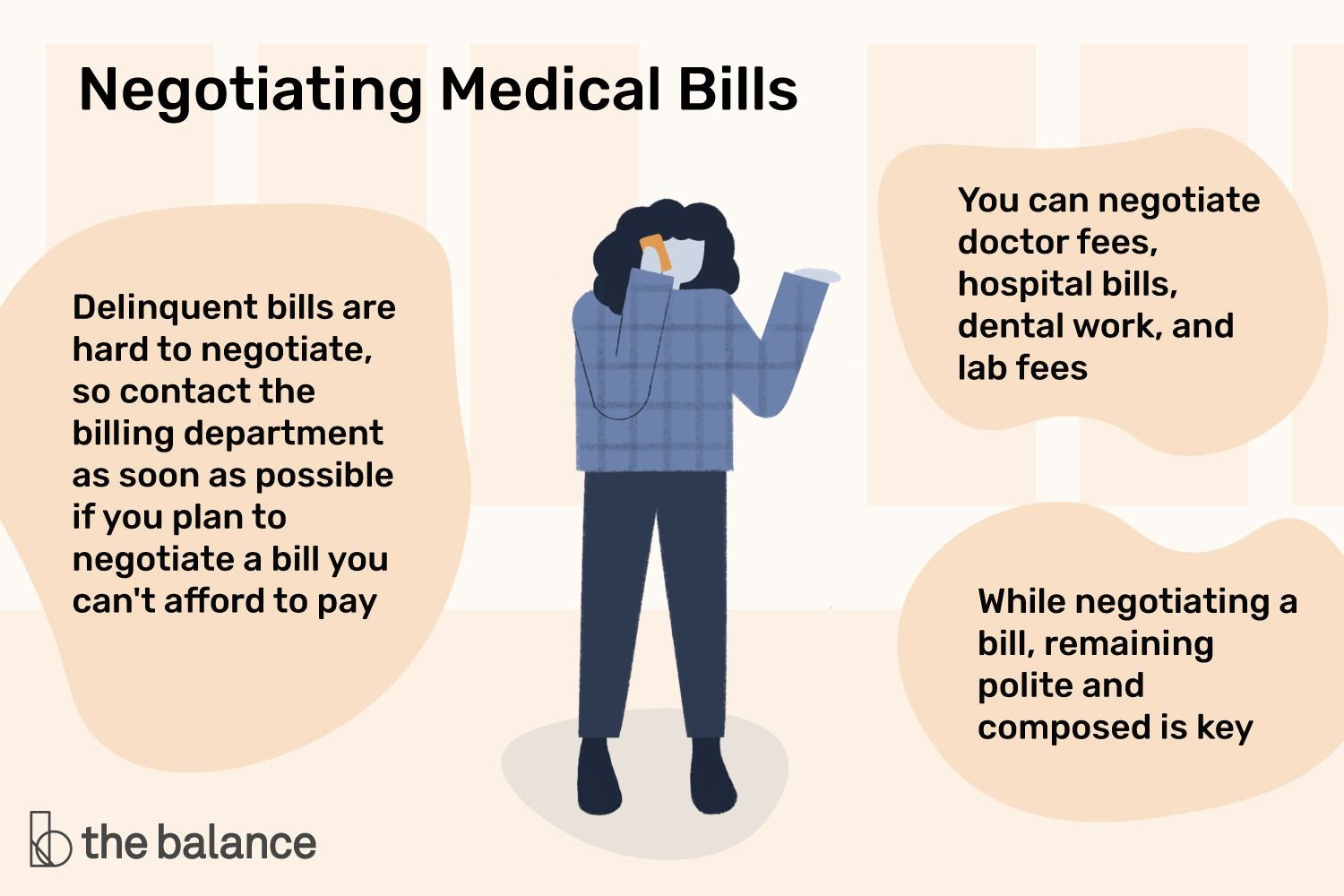Negotiating medical bills can be a daunting task, but fear not! We’ve got you covered with some valuable tips for successfully navigating this challenging process. Medical expenses can quickly pile up, leaving you feeling overwhelmed and unsure of where to start. However, by employing these effective strategies, you can take charge of your medical bills and potentially save yourself a significant amount of money. So, if you’re looking to ease the financial burden of healthcare costs, keep reading for expert advice on negotiating medical bills.
Tips for Negotiating Medical Bills
When faced with medical bills, negotiating can help you reduce your financial burden and find more affordable repayment options. Medical expenses can quickly add up, causing stress and anxiety. However, by taking proactive steps and understanding the negotiation process, you can potentially save money and gain peace of mind. In this article, we will discuss several valuable tips for negotiating medical bills effectively.
1. Review Your Medical Bills
Before initiating any negotiation, it’s crucial to carefully review your medical bills. Understanding the charges, services rendered, and any errors or inconsistencies will provide you with a solid foundation to negotiate from. Here are a few steps to follow:
- Check for duplicate charges or services you didn’t receive.
- Verify that the billing codes accurately reflect the services provided.
- Compare your bills to any explanation of benefits (EOB) documents you’ve received from your insurance company.
- Ask your healthcare provider or insurer for an itemized bill.
By thoroughly reviewing your medical bills, you can identify potential errors or discrepancies that may be negotiable.
2. Understand Your Insurance Coverage
Having a comprehensive understanding of your insurance coverage is vital when negotiating medical bills. Here’s what you need to consider:
- Know your deductible, copayment, and out-of-pocket maximum.
- Familiarize yourself with your insurance company’s network policies.
- Understand what services and treatments are covered by your insurance plan.
- Be aware of any pre-authorization requirements.
When negotiating, you can use this knowledge to your advantage and request adjustments based on your insurance coverage.
3. Communicate with Your Healthcare Provider
Open and honest communication with your healthcare provider is crucial during the negotiation process. Here’s how to effectively communicate your concerns:
- Contact the billing department or financial counselor at your healthcare provider’s office.
- Explain your financial situation and your inability to afford the full amount.
- Ask if they offer any financial assistance programs or payment plans.
- Provide any supporting documentation, such as income statements or proof of hardship.
By initiating a dialogue, you can find common ground and explore potential options for reducing your medical bills.
4. Explore Financial Assistance Programs
Many healthcare providers offer financial assistance programs for individuals who are unable to pay their medical bills in full. These programs can significantly reduce your financial burden. Here’s how to take advantage of them:
- Ask your healthcare provider about available assistance programs.
- Submit any required documentation to determine your eligibility.
- Discuss your options with a financial counselor.
- Explore government assistance programs like Medicaid or Medicare if applicable.
These programs are designed to help individuals who are struggling to pay their medical bills, so make sure to take advantage of them if you qualify.
5. Research and Compare Prices
Before undergoing any medical procedure or treatment, it’s essential to research and compare prices from different healthcare providers. By doing so, you can choose more affordable options and potentially negotiate better rates. Here’s how to approach it:
- Research the average cost of the procedure or treatment in your area.
- Contact multiple healthcare providers and request price estimates.
- Compare the prices and services offered.
- Use this information to negotiate for a lower rate with your preferred provider.
Being proactive and well-informed about pricing can put you in a stronger position to negotiate medical bills.
6. Hire a Medical Bill Advocate
If negotiating on your own becomes overwhelming or you are unsure of the best approach, consider hiring a medical bill advocate. These professionals are experienced in navigating the complexities of medical billing and can:
- Review your medical bills and insurance coverage.
- Negotiate on your behalf with healthcare providers and insurance companies.
- Identify potential errors or overcharges.
- Help you understand your rights and options.
A medical bill advocate can greatly assist you in achieving the best possible outcome and ensure your rights are protected.
7. Negotiate a Payment Plan
If negotiating a reduced bill upfront is not feasible, consider negotiating a manageable payment plan. Here’s how to approach it:
- Discuss your financial constraints with your healthcare provider.
- Propose a monthly payment plan that fits your budget.
- Emphasize your commitment to fulfilling your financial obligations.
- Request any interest or late payment fees to be waived.
Most healthcare providers are willing to work with patients to establish reasonable payment plans, allowing you to pay off your medical bills over time.
8. Stay Persistent and Document Everything
Persistence is key when negotiating medical bills. Keep detailed records of all your communications, including dates, names, and summaries of conversations. This documentation will be valuable if any disputes or issues arise later on. Additionally, don’t hesitate to escalate your concerns to higher-level supervisors or administrators if necessary.
In conclusion, negotiating medical bills requires proactive communication, research, and persistence. By reviewing your bills, understanding your insurance coverage, exploring financial assistance programs, and effectively communicating with your healthcare provider, you can significantly reduce your medical expenses. Remember, there are resources and professionals available to assist you throughout the process. Take control of your medical bills and find a more manageable path toward financial stability.
How to negotiate a medical bill and other insurance tips
Frequently Asked Questions
Tips for Negotiating Medical Bills FAQs
1. How can I negotiate my medical bills?
When negotiating medical bills, start by reviewing your itemized bill for any errors or unnecessary charges. Contact the healthcare provider or billing department to discuss payment options, such as setting up a payment plan, requesting a discount, or negotiating a lower bill based on your financial circumstances.
2. What should I do before negotiating medical bills?
Prior to negotiating medical bills, gather all relevant documents, including your medical records, insurance policy, and explanation of benefits (EOB). Familiarize yourself with your insurance coverage and any applicable state laws regarding billing and negotiation. It’s also helpful to research average prices for medical services in your area.
3. Can I negotiate my medical bills even if I have insurance?
Yes, you can negotiate medical bills even if you have insurance. Sometimes insurance providers don’t cover certain procedures or treatments fully, leaving you responsible for a portion of the bill. In such cases, you can negotiate with the healthcare provider to reduce the remaining balance or set up a payment plan.
4. What are some effective negotiation strategies for lowering medical bills?
Some effective negotiation strategies for lowering medical bills include: being polite and respectful when speaking with the billing department, asking for a detailed breakdown of charges, comparing prices with other providers, offering to pay a lump sum upfront, explaining your financial hardship, and highlighting any errors or discrepancies on the bill.
5. Should I hire a professional to negotiate my medical bills?
Hiring a professional to negotiate medical bills is an option, but it’s not always necessary. Most individuals can negotiate their medical bills on their own, especially if they come prepared with the necessary information and have a good understanding of their insurance coverage. Hiring a professional may be more useful for complex cases or for those who feel overwhelmed by the process.
6. Can I negotiate a medical bill after it has been sent to collections?
Yes, you can still negotiate a medical bill after it has been sent to collections. Contact the collections agency to discuss your options, including negotiating a reduced settlement amount or arranging a payment plan. Be sure to get any agreements in writing and keep records of all communication.
7. Is it possible to negotiate medical bills if I have a low income?
Yes, it is possible to negotiate medical bills if you have a low income. Many healthcare providers have financial assistance programs or sliding-scale fees based on income. Reach out to the billing department to inquire about these options and provide documentation of your income to support your request for assistance.
8. What if the healthcare provider refuses to negotiate my medical bills?
If the healthcare provider refuses to negotiate your medical bills, you still have several options. You can file a formal complaint with your state’s medical board, contact your insurance company to seek their assistance, or consult a consumer advocacy organization that specializes in healthcare billing issues. It’s important to explore all available avenues to resolve the situation.
Final Thoughts
In conclusion, negotiating medical bills can be a daunting task, but with the right approach and knowledge, you can significantly reduce your healthcare expenses. Start by reviewing your bills carefully, checking for any errors or unnecessary charges. Researching and comparing prices for services can also give you leverage during negotiations. Communicate openly with your healthcare provider and insurance company, advocating for yourself and exploring options like payment plans or discounts. Remember to stay resilient and persistent, ensuring that you are treated fairly and receive the best possible outcome. By following these tips for negotiating medical bills, you can take control of your healthcare costs, save money, and achieve peace of mind.



